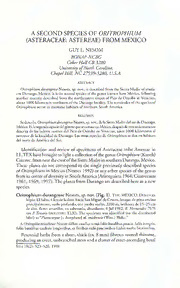
A SECOND SPECIES OF ORITROPHIUM (ASTERACEAE: ASTEREAE) FROM MEXICO PDF
Preview A SECOND SPECIES OF ORITROPHIUM (ASTERACEAE: ASTEREAE) FROM MEXICO
ASECOND SPECIES OF ORITROPHIUM (ASTERACEAE:ASTEREAE) FROMMEXICO GUYL.NESOM BONAP-NCBG CokerHallCB3280 UniversityofNorthCarolina, ChapelHill,NC27599-3280, U.S.A. ABSTRACT OritrophiumdurangenseNesom,sp.nov.,isdescribedfromtheSierraMadreofsoutfi- ernDurango,Mexico.ItisthesecondspeciesofthegenusknownfromMexico,following anotherrecentlydescribedfromthenortheasternslopesofPicodeOrizabainVeracruz, about1000kilometersnorthwestoftheDurangolocality.Theremainderofthespeciesof OritrophiumoccurinmontanehabitatsofnorthernSouthAmerica. RESUMEN SedescribeOritrophiumdurangense^esom,sp.nov.,delaSierraMadredelsurdeDurango, Mexico.EslasegundaespeciedelgeneroqueseconoceenMexico,despuesdeotrarecientemente descritadelasladerasnorestedelPicodeOrizabaenVeracruz,unos1000kilometrosal noroestedelalocalidaddeDurango.LasotrasespeciesdeOritrophiumsedanenhabitats delnortcdeAmericadelSur. IdentificationandreviewofspecimensofAsteraceaetribeAstereaein LL,TEXhavebroughttolightacollectionofthegenusOritrophium(Kunth) Cuatrec.fromnearthecrestoftheSierraMadreinsouthernDurango,Mexico. Theseplantsdonotcorrespondtothesinglepreviouslydescribedspecies oi^OritrophiuminMexico(Nesom1992)oranyotherspeciesofthegenus fromitscenterofdiversityinSouthAmerica(Aristeguieta1964;Cuatrecasas 1961, 1969, 1997).TheplantsfromDurangoaredescribedhereasanew species. OritrophiumdurangenseNesom,sp.nov.(Fig.1).Type:MEXICO.Duran(;;o: Mpio.ElSalto,4kmdeladesv.haciaSanMigueldeCruces,bosquedepino-encino principalmente,sueloprofundo,conpiedrasuelto,2200m;herbaceade15-25cm dealto,floresamarillas,encabezuela,abundante;6Jul1982,R.Hernandez7676 conP.Tenorio(noi.OTYPE:TEX!).Thespecimenwasidentified(onthedistributed label)as''Pionocarpus[=lostephane]af.madrensis(Wats.)Blake." AOritrophioorizabenseNesomdiffertcaudicetenuifoliisbasalibuspaucis,foliisintegris, foliisbasalibuscaulinislongioribus,etfloribusradiipaucioribuslimbismultobrcvioribus. Perennialherbsfromashort,thick(ca.8mm)fibrous-rootedrhizome, producinganerect,unbranchedstemandaclusteroferect-ascendingbasal SiDA18(2):523-526.1998 524 SiDA18(. .'^^J''.<> I'ld. 1.IlabitilluMiationofOritropljiurutluvdrigeiisc,fioniihctypecollection. NesOiM,asecondspeciesofOritrophium 525 leaves.Stems12—16(—25)cmtall,purplish,minutelypubescentwithamixture ofTypeBandTypeCtrichomes(seeNesom1976forillustrations),most denselysoneartheheads. Leavesbasal (largest) andcauline (reducedin size);basalleaveslinear, 1-nerved,entire,flat,somewhatsucculent,7—14 cmlong,3-6mmwide,graduallytaperedtoalong,sharppoint,glabrous exceptnearthebase,wherelong,thin,cobwebbyhairs (TypeB) become copiousandconspicuousneartheleafinsertion;caulineleavesreducedin sizefromthebasal,linear-lanceolate, 10—14mmlong,2—2.5mmwideat thebase,subclaspingbutnotatallauriculate,7—11perstem,relativelyeven- sizedupthestem,with internodes 1-3cmlong, mostcloselyspaced to- wardthebase. Headsradiate, turbinate, theinvolucres 10—14mmwide; phyllariesthin-herbaceous,withoutconspicuousvenation,purpleonthe marginsandapex,nearlyflat,oblong-lanceolate,mostlywithacuteapices, slightlylacerate-fringed onthedistalmargins, in 3(—4) graduatedseries, theinnermost8—10mmlong,ca.2mmwide,theoutermost 1/2—2/3as longastheinner;receptaclesflat,epaleate. Rayflowerspistillate,ca. 10— 15inasingleseries,thecorollas6—7mmlong,thelimbs3—5 mmlong, mm barelyexsertedfromthehead,whiteorcreamy,1.8 wide,apicallycoiling, denselyinvestedwithviscid,unicellularhairsaroundthetube-limbjunc- mm tion,thetubeca2 long;discflowersfunctionallystaminate,withregular mm corollas,5 long,yellow,narrowlytubular-funnelform,thelobestrian- mm mm gular,1 long,thestylebrancheslinear-lanceolate,1.8 long,densely long-papillate,withoutstigmaticlines.Rayachenesfertile,denselysericeous, mm eglandular, 5-nerved, ca. 5 long(notcompletelymature), narrowly oblong,withpappusofnumerousbarbellatebristles4-5mmlongin 1—2 series;discovariessterile,withpappusbristlesnearlysmooth,equallingthe disccorollalength. Thenewspeciesisknownonlyfromthetypecollection.Thetypesheet apparentlybearstwoplants(onewithouttheroot/caudexsystem)andfour basalleavesdisconnectedfromaplant.Theillustration"attaches"several oftheseleavestothemorecompleteplant. Itislikelythatasingleplant mayproduceseveralfloweringstems,asischaracteristicofotherspeciesof thegenus. Theplantso^Oritrophiumdurangensearesimpleinhabitbutdistinctin appearance,producingafew,linear,basalleaves,asingle,monocephalous stemwithafew,small,nearlybracteatecaulineleaves,andarelativelysmall head.Theraycorollasarewhiteandapparentlybarelyexsertedfromthe involucre,perhapsaccountingforwhythecollectorsdescribedtheflowers asyellow (thecolorofthedisccorollas). Still, itseems unusual thatthe speciesiscurrentlyknownonlyfromasinglecollection,sincenumerous botanistshavepassedthroughtheareaandmadecollections.Thecollec- torsofO.durangensenotedthatitwas"abundante." 526 SinAl8(2) TheseplantsareunequivocallyidentifiedasthegenusOritrophiumbya distinctivesetoffeatures:monocephalousherbsproducingabasalrosette ofelongateleaves,whiterays,functionallystaminatediscflowers(withsterile ovariesandassociatedfeaturesofthestylebranches), phyllarieswith in- conspicuousvenation,copiouslyelaborated,thin,nearlyfloccosewhitehairs (TypeBtrichomes)intheaxilsofthebasalleaves,andalackoflong,uniseriate, thick-walledtrichomes(TypeAtrichomes).Thenewspeciesisperhapsrelated to O. orizabenseandasmallgroupofVenezuelanspecies (Nesom 1992), butthisisspeculative.ThetwoMexicanspeciesaredifferentenoughfrom eachotherthatevenahypothesisofsisterrelationshipbetweenthemisobscure. ThenewspeciesdiffersfromOritrophiumorizabenseinitsrelativelythin caudex/rhizome(8mmvs.7-15mm)withfewbasalleaves(vs.denseclus- terofbasalleaves),entire(vs.serrate)leaves,longerleaves(basal7—14cm v1s51vs..5—241.-03c7m),wciatuhlimnuec1h0—sh1o4rtmermlivsm.b4s-(63-m5mm),mavnsd.f7e-w1e0rmramy)f.loWwheirsle(1t0h-e habitatofO.orizabenseisacliffface,thatofO.durangenseisinsoil("stielo profundo"),probablyinarelativelyflatarea,withlooserocks("conpiedra suelto").ThehabitatofO. orizabenseapparentlyismorelikethatofmost oftheSouthAmericanspecies,whichgenerallygrow"inwetplaces, the marshyandswampygroundoftheparamos, locationsthatarevisitedby birdslookingforwaterandseeds"(Cuatrecasas 1997,p.289). Oritrophiumorizabense'isdisjunctfromthemainpartofthegenus(from theclosestpointofdistributioninVenezuela) byabout 1500kilometers. TheseparationbetweenO.durangenseds\dO.orizabensehabout1000kilometers, withthelatterthemidpointinmoreorlessastraightline,makingthedis- tancebetweentheDurangolocalityandthoseinSouthAmericaabout2500 kilometers. ACKNOWLl'DGMEN'l'S IamgratefultothestaffofLL,TEXforaccomodatingarecentvisitthere, HaroldRobinsonforprovidingacopyoftherecentsynopsisbyCuatrecasas, andJohnPruskiandTimLowreyforcommentsonthemanuscript. RHI-ERHNCI-:S Arisikcliifia,L. 1964.Cxnnpositae.FloradcVenezut-hi10:1-483. CuA'rRiiCASAS,J. 1961.NocassobreAstereasAndinas.C'.iencia[Mexico]21:21-32. CuAiRi-CASAS,J. 1969.PrimafloraColombiaiia.3.Compositae-Astcreac.Webbia24:1- 335. C]UA'rRlx;ASA,s,J.1997.Synopsi.softheneotropicalgenusOritrophium(Astcraceae:Asrereae). BioLlania,EdicionEspecial6:287-303. Ni-:soM,G.L.1976.AnewspeciesofErigeroii(Astcraceae)anditsrelativesinsouthwest- ernUtah.Brittonia28:263-272. Nf.som,G.L. 1992.Oritrophiumorizabense(Astcraceae:Asiereae),anewspeciesantithe firstreportofthegenusfromNorthAmerica.Phytologia73:338—344.
